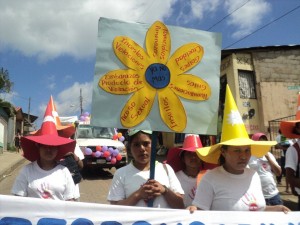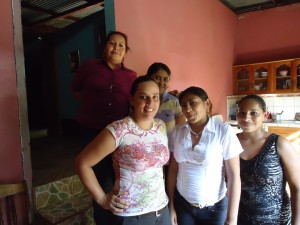
More than a year ago, Nicaragua passed the Comprehensive Law Against Violence Toward Women (Law 779), which represents significant advances in addressing a pervasive problem in the country. The law recognizes that violence takes many forms—physical, psychological, sexual and economic. It also calls for more state resources to respond to violence against women—in all ways that it manifests. It condemns any public official who gets in the way of women pursuing justice in the courts, and it directs federal resources to build violence prevention programs.The law is comprehensive in addressing multiple forms of violence, but does it skillfully address Nicaragua’s demographic and regional diversity? Checking the pulse on this step forward, AJWS grantees in Nicaragua offer insights about the law’s challenges and opportunities:
1) Nicaragua needs multi-cultural approaches to ensure access to justice in indigenous communities.
Law 779 stipulates that all cases of violence against women must be submitted to the state courts for resolution. While this is well-intended to ensure women’s access to legal means for justice, it also poses some unique obstacles to indigenous communities. Historically, indigenous communities have solved disputes through their own legal system, led by what are known as “Councils of the Elderly” and traditional judges. Any issues of violence have been addressed through community-based mediation, where the council and community judge recommend appropriate resolutions. By prohibiting access to this communal justice system, the law minimizes the role of long-held traditions of a significant portion of the Nicaraguan population.
On the other hand, the law provides specific protections that—when enforced—can strengthen awareness in the community and build support around ending violence against women. By providing resources for increased state services, the law can support the work of grassroots groups that are conducting culturally sensitive work on this issue. For example, AJWS partner Coordinadora Chorotega de Pueblos Indigenas (Coordinadora Chorotega) supports a women’s network in the indigenous community of Totogalpa that is building dialogue about the new legal protections for women affected by violence. It recently held an exchange with the community of Mozonte about priorities for the human rights of indigenous women in the region, including discussions about creating a community response to violence and the law’s implementation—all framed in a manner that respects indigenous cultural perspectives.
2) Long distances and high costs remain obstacles for indigenous women’s access to justice.
Additionally, by stipulating that all cases of violence against women must be tried in state courts, the law poses a barrier to women’s rights for those who have limited access to the court system, either due to geographical dispersion or lack of resources devoted to the justice system in indigenous areas.
To access state services, most indigenous women must travel long distances and incur high transportation costs; some women must travel up to a week just to file their cases. Furthermore, in Nicaragua’s North Atlantic Autonomous Region (RAAN), the state provides only two attorneys that will hear violence against women cases in the RAAN, a predominantly indigenous region spanning half of Nicaragua’s Atlantic coast, with an area of 32,159 km and an estimated population of only 394,792. This is staggering, considering that the RAAN is the region with the highest levels of violence against women in Nicaragua; according to the Nicaragua’s Demographic and Health Survey conducted in 2007, 34 percent of all women in the RAAN have been affected by violence. Without increased state resources to respond to high incidences of violence, there is a risk that the mediation for cases of violence against women will become increasingly hidden.
Responding to factors that muffle the law’s implementation, Collective Gaviota (Asociación por la Humanización de la Vida—Colectivo Gaviota Colectivo) is working with communal indigenous authorities and women leaders to increase access to the formal justice system. Through this work, indigenous women are analyzing Nicaragua’s legal system, developing strategies to advocate for their rights within their communities, and are increasingly gaining recognition from communal authorities on their role as advisers on women’s rights.

3) The state must provide resources to eliminate gender-based violence.
Following the approval of Law 779, there was a promising rise in the number of violence cases reported to the police—when previously many would have gone unreported. This was partly due to the efforts of grassroots organizations like Waslala Association of Entrepreneurial Women (Asociacion de Mujeres Emprendedoras de Waslala —AMEWAS), which carried out a campaign about the law’s provisions with its communities, police officers and health service providers.
While there has been increased state pressure to improve the local response to violence against women, in order to fully implement the law, the state must allocate a sufficient budget to prosecute the increased number of reported violence cases, provide more trainings for state officials about the implementation of the law, and strengthen violence prevention initiatives. AMEWAS has worked to strengthen coordination with state officials and is working with the police to establish priorities for the local government and develop a plan to strengthen police and government’s response to violence. AMEWAS also conducts violence prevention education with its youth network and through a community-wide radio program.
These efforts must be combined with more resources and political will to respond to violence against women on a national scale.
4) Nicaragua’s laws must confront stigma and discrimination.
While the new law asks for holistic and expedient health services for women, particularly in response to cases of violence, it unfortunately fails to ensure equal access for populations of women on the margins of society—lesbian, bisexual and transgender women and sex workers.
In November of 2012, a sex worker in Nicaragua was severely injured by an aggressor. Despite the severity of her injuries, the local health center refused to provide her any services. A local advocacy group stepped in to support her and she was finally admitted for medical care two days after the attack.
Law 779 also fails to directly address violence based on sexual orientation or gender identity. The health department does not maintain a record regarding health services support for transgender people and the police department does not keep track of violence against transgender women. Weak recognition of specific vulnerabilities faced by lesbian, bisexual and transgender (LBT) women within Nicaragua’s legal framework translates to weak responses to violence against LBT women.
To help address this problem, both the Nicaraguan Association of Transgender Women (Asociacion Nicaraguense de Transgeneras—ANIT) and the Nicaraguan Group of Lesbian Women Safo (Grupo Safo) address discrimination based on sexual orientation and gender identity in health centers and within the police department. Grupo Safo is conducting trainings with the police to raise awareness about lesbian and bisexual women’s rights and ANIT is advocating with decision-makers at the national level to strengthen the state’s response to discrimination and violence against transgender women.
***
In sum, while recognizing the great potential of Law 779, strategies for its implementation need to consider diverse perspectives and needs. To best use the protections guaranteed in this law, the state must incorporate the voices of all members of civil society to develop an approach that recognizes, works with and addresses Nicaragua’s diverse population. Legal advances and grassroots efforts can go hand-in-hand to make sure that every woman in Nicaragua has the safety and protection she deserves.
Luis Diaz-Albertini is a former program officer for the Americas at American Jewish World Service.
AJWS’s work in countries and communities changes over time, responding to the evolving needs of partner organizations and the people they serve. To learn where AJWS is supporting activists and social justice movements today, please see Where We Work.

